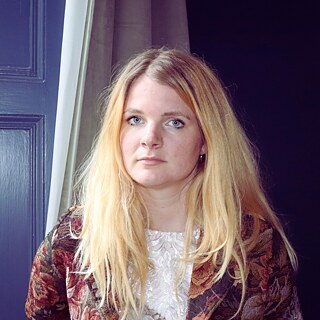Jenny Erpenbeck
Kairos

Kairos by Jenny Erpenbeck, impressively translated by Michael Hofmann bares witness to a harrowing toxic love affair against the backdrop of the fall of the Berlin Wall and the final years of the GDR. Much like the novel Cleopatra and Frankenstein by Coco Mellors it displays the intricate power dynamics between young women and much older men.
In an era where online dating is the prevalent form of finding love, a chance encounter, a fateful meeting like star-crossed lovers feels almost too good to be true and in the case of Jenny Erpenbeck’s Kairos, it most certainly is.
Katharina and Hans's relationship begins with an almost cinematic encounter. They meet on a bus in East Berlin on a summer day in July, a seemingly serendipitous moment as they both nearly missed the ride. When they both leave the bus at the same stop and a sudden downpour forces them to seek shelter under a bridge, they lock eyes and start walking into the same direction: “It feels good to be walking beside him, she thinks. It feels good to be walking beside her, he thinks.” Erpenbeck's choice of the title Kairos – a reference to the Greek god of fortunate moments who can only be seized by the lock of hair on his forehead – sets the tone for the narrative.
Much like the early days of the GDR, characterised by a romanticised belief in a utopian state, Katharina and Hans both initially believe they have found great love within each other, however, as the narrative unfolds, the power imbalance between the two becomes increasingly apparent and a downward spiral of violence, jealousy and betrayal ensues. Hans, 34 years older than Katharina, and married with a son is unfortunately exactly the kind of man-child one suspects him to be. Unable to leave his wife with whom he has some kind of an understanding in regards to his infidelity and always on the verge of leaving Katharina as he already foresees her to leave him someday. He tries to force her into submission and what begins as consensual rough play during sex soon escalates into sheer violence, stripping away the veneer of romance and leaving in its wake a toxic and abusive relationship. A transformation of love into hatred which in some way mirrors the disillusionment many felt as the GDR's idealistic promises gave way to harsher realities.
Interestingly, Coco Mellors hit novel Cleopatra and Frankenstein also begins with an intense, chance encounter that propels the stories forward, drawing on themes of inevitability and fate. Which probes the question: What do these beautiful young women seek in older men who are often described in sparse, almost utilitarian terms as simply “handsome"? Both books make me think of songs like Lana Del Rey's Summertime Sadness or Sofia Coppola's film Priscilla. Describing young women who could practically do and be anything they wanted to be, but find themselves trapped in relationships that start out bright and nurturing and end in self-destruction. Perhaps the answer lies in the conjunction of naivety and masked predatory behaviour that creates the illusion of experience, financial stability and safety – fantasies that, as both novels show come with huge costs and sacrifice.
Jenny Erpenbeck, who grew up in the GDR manages to intertwine the atmosphere of a political system collapsing with that of a relationship. Erpenbeck already a significant figure in international literature, solidified her standing by winning the International Booker Prize this year, making Kairos the first German book in translation to be granted this honour. In the jury decision it stated that “it starts with love and passion, but it’s at least as much about power, art and culture. The self-absorption of the lovers, their descent into a destructive vortex, remains connected to the larger history of East Germany during this period, often meeting history at odd angles.”
In the prologue of Kairos, Hans has just died. We’re in the present time around 30 years later and Katharina receiving two boxes with documents from him, sieves through them. Previously he had asked her to come to his funeral. – She didn’t make it.
You will find further information about the book/s and how to borrow them below under Related Links.
ABOUT THE AUTHOR

The article was first published in the dossier Book Blog: Literary Tastings by Goethe-Institut Glasgow.